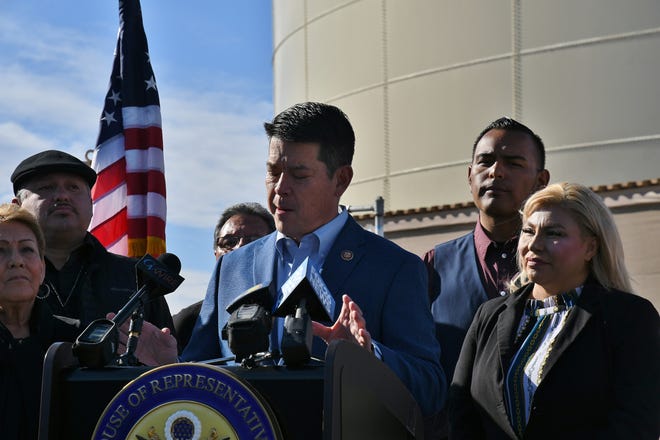Visalia Times Delta
Rep. TJ Cox says it’s time for feds to ‘step up’ to drinking water crisis, announces $100M bill
December 3, 2019
PARLIER — Rep. TJ Cox unveiled a $100 million “slice of justice” for families in the San Juaquin Valley — and across the nation — suffering contaminated drinking water and crumbling infrastructure.
On Monday, Cox and a smattering of Valley mayors visited a water storage facility in the rural Fresno County community of Pariler, where the congressman announced the Disadvantaged Community Drinking Water Assistance Act.
The proposed bill will help to “close the gap” in funding for impoverished, mid-sized cities that fall through the cracks under current law.
To qualify, communities must have populations numbering fewer than 60,000 people and median household incomes of less than about $65,000. That includes many Tulare County cities, including Porterville and Lindsay.
Tulare just misses the cutoff, counting 63,000 people. Its water system has struggled with 1,2,3 TCP contamination for years and its Matheny Tract neighborhood was ground zero for the state’s efforts to legally force smaller water systems to consolidate with larger, neighboring utilities.
Matheny was featured in a New York Times article last week pinning water inequality in rural California to Jim Crow-era laws and racial injustice.
If passed, Cox said his bill will complement California’s Safe and Affordable Drinking Water Fund, a landmark $130 million bill passed earlier this year to provide long-term solutions to struggling water systems statewide.
“We provide the world with fruit and vegetables, but if we can’t provide the key ingredient of life for our own people, then I think we’ve really failed the most basic test of governance,” said Cox, whose district encompasses all of Kings County and parts of Tulare, Fresno and Kern counties.
“We can’t stop until the water coming out of every tap is never in doubt.”
Cox worked closely with cities in his district and with environmental justice groups across the Valley to draft the bill that could help dozens of cities achieve safe drinking water standards, he said.
“Ultimately, the goal is to create healthier communities, more affordable communities so that the Valley can continue to thrive as it has for so many years,” said Jessi Snyder of Visalia-based nonprofit Self Help Enterprises.
Self Help has worked to create affordable housing and bring technical assistance to underserved Valley communities and water systems for decades.
Many of the communities Snyder works with have water tainted by both agricultural runoff and naturally-occurring chemicals, including arsenic.
Wells in Parlier and Delano are out of production because they exceed the state’s minimum contaminant level for 1,2,3 TCP, a toxic byproduct of plastic production that industrial giants Dow Chemical Company and Shell pumped into pesticides and sold to Valley farmers decades ago.

Rep. TJ Cox and several Central Valley mayors visited Parlier’s water storage facility in Fresno county to announce the Disadvantaged Community Water Assistance Act on Dec. 2nd
While state aid is available, city leaders say it’s not enough to pay for treatment plants that cost millions of dollars annually to build and operate.
Delano Councilwoman Grace Vallejo called Cox’s bill a “lifesaver” for her city of about 53,000 — too big to qualify for USDA grants but too small to pay for costly treatment facilities without slamming residents with sky-high utility bills.
“DC needs to hear us: We need clean drinking water if we’re going to continue to bring them the fruit and vegetables they need to feed their families,” said Alex Garcia, mayor of Wasco, another Kern County ag community plagued by 1,2,3 TCP.
It’s time for the federal government to “step up” to solving a drinking water crisis that continues to affect more than 1 million people in California alone, according to the State Water Resources Control Board, Cox said.
“The state is doing their part, now it’s time for the federal government to step up to solve this crisis
In Huron, another small Fresno County city, residents pay an average of $119 a month for water they are frequently told is unsafe to drink by state officials.
The city’s mayor, Rey León, pointed out that many farmworker families “pay double” for their water in the nation’s richest agricultural county.
“That’s injustice,” he said. “Agriculture depends on farmworkers. The healthier our families are, the healthier our economy is.”
Cox is the latest in a litany of legislators to visit the rural Central Valley this year with promises of cleaning up drinking water and aging infrastructure.
In February, newly-elected Gov. Gavin Newsom visited a school in nearby Reedley to sign his first bill into law, $131 million in emergency funding to help alleviate the state’s drinking water crisis.
State Senator Melissa Hurtado authored Senate Bill 559, a $400 million package meant to fund repairs to the Friant-Kern Canal, one of the Valley’s major irrigation arteries. Her bipartisan bill is languishing at the legislator and will fail if not passed by Jan. 31.
It’s unclear if Cox’s proposal will suffer a similar fate but overlooked Central Valley residents are hopeful for relief.
“We have nowhere else to turn. No one else has ever reached out to ask,” Vallejo said.

